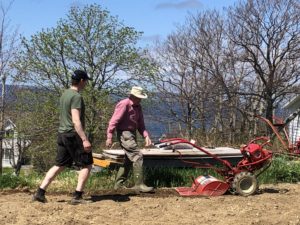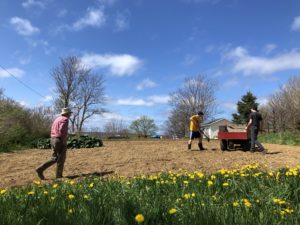During a discussion about our children’s schooling and the pandemic’s effect on their quality of education – our Mother was quick to remind us that many of England’s schools were closed for the duration of World War II and that generation proved to be extremely successful. Supported with an important footnote; for those children were engaged in many extraordinary activities, spent much time in the company of adults, and developed a special bond through their dependence on each other and the need for a unified front.
Something we experienced firsthand this past weekend.

“… unearthing new soil…”
As part of our pandemic preparations, we have expanded the size of our “Victory Garden” at the family homestead in Topsail; turning over fresh sods and unearthing new soil for planting. There is a lot more work this year so we were thankful when our cousin showed up with his two fine sons, anxious to learn and partake in all the fun farming activities – especially the array of “cool” equipment like quads, tillers, plows, chain saws, winches, and splitters.
Though they aren’t exactly “City Folk” – this was an entirely unique experience and these young teens were thrilled to participate; responding eagerly to instruction and the opportunity to get their hands on anything that burned gasoline and doubled down on the element of danger.

“… the planting seeds…”
A commercial “Broiler” farm delivered a truck load of chicken manure to fertilize the ground, ‘Gaze’ arranged the planting seeds, while Uncle Dominic and our father supervised the many work details. Throughout it all, Mom and Uncle Pat kept cold drinks flowing, along with a shocking pile of grub; citing Captain Ches Crosbie’s famous sealing quote; “You’re no good to me if you’re no good to eat, lads!”

“… you’re no good to eat…”
During our “lunch breaks” the adults praised the boys work ethic, thanking them for their efforts, and reminding them of the importance of their toil. Not just for the immediate future and the only form of food security we can reasonably expect in Newfoundland’s tough growing environment – but as well, for their role as “indentured servants” in a modern world.
One of the lads winced at this reference and his obvious misinterpretation, attempting to retain some dignity with a laughing comment on slavery.

“… not slavery…”
Father was quick to pick up on this and explained; aside from an unfortunately similar spelling, “servitude” had nothing to do with slavery and was more akin to a form of apprenticeship. “You boys are hoping to raise your own garden, right? Just think about everything you learned here today. Now try to imagine boys your age scraveling to survive in the streets of 17th century England, pining for a a fresh start, but terrified of the many challenges in an unknown world. There was no way they could provision for such an adventure – and even if they could afford a kit, they’d have no way of knowing how to properly appoint themselves.”
Established “planters” (a Newfoundland term for colonist) were expanding operations in the “New World” and they needed more people to help grow the colony – in every sense of the word. Migration was necessary for the development of larger communities and the synergies they’d create. There were plenty of natural resources and a hard-working family could accumulate substantial wealth, so attracting people was relatively easy. But this was a completely foreign land and success was hinged on a proper indoctrination and training program.

“… strong back and a will to learn…”
Newcomers were thus welcomed with a contract of “servitude” that promised a job – as well as the cost of passage, housing, food, training, and medical attention. In return, an “indentured” worker provided a strong back and a willingness to learn. Upon completion of that contract, they were entitled to a grant of land and enough supplies to get started on their own future.
We worked hard this weekend and there’s no doubt it must have felt like slavery at times. An extreme assessment perhaps – but without a reasonable comparable in today’s world of comfort and convenience, how else might they judge their toil? Thankfully, all seemed to enjoy the experience and we hope they focus on the satisfaction of a job well done; recognizing the opportunity and the knowledge they might pass to future generations. Only time will tell – well, that and their willingness to show up and finish the job tomorrow
Make no wonder our forefathers formalized written contracts of “servitude” – it takes a shocking level of commitment to see this job to its end.

“… shocking level of commitment…”

